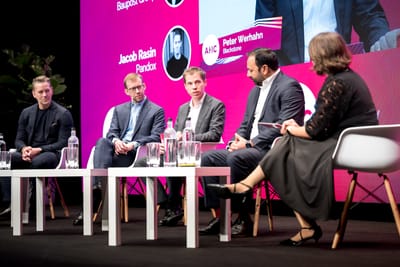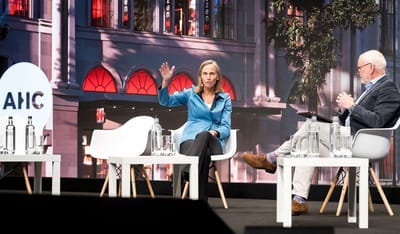
Olympia’s Hotel Vision Stage was still filling when show ambassador Peter Hancock threw down a challenge:
“Hotels are not just a place to lay your head; the future is multifaceted.”
His provocation framed ninety minutes of rapid-fire case studies in which three operators—Paul Bayliss of Hotel Brooklyn, Tara Robinson of Eden Hotel Collection and Chris Penn of Birch Community—unpacked how they now treat lobbies, rooftops and gardens as cash-flow engines rather than décor.
A rooftop that out-yields bedrooms
Bayliss began with a slide of the Manchester skyline. Where air-handling plant once hummed, Hotel Brooklyn now offers a micro-wedding deck holding sixty guests. Cap-ex was £38 k for decking, glass balustrades and an all-weather awning. “We targeted twenty-five ceremonies in year one and hit thirty-eight,” he said. At a £2,500 hire fee plus F&B minimums, the roof paid for itself in eleven months and now delivers an 87 percent gross margin—far higher than the 57 percent the same square metres would achieve as standard doubles.
Packaging shoulder-season demand
Robinson followed, brandishing a guest-satisfaction graph from Bovey Castle. Her “Stargaze & Sip” bundle runs on winter Tuesdays when occupancy slumps. For £95 a head guests receive a whisky flight, a telescope tutorial and a fleece blanket embroidered with the hotel crest. The add-on lifted mid-week ADR by fourteen percent last January versus the same period in 2021 and, more importantly, drove £22 average incremental bar spend. “People stay up late, buy one more dram and post it all on Instagram,” she noted, adding that the property’s hashtag impressions quadrupled during each activation night.
Turning a lobby into a subscription club
Penn closed the trio, recounting Birch Cheshunt’s pivot from ad-hoc day passes to a Netflix-style plan. For £150 a month members receive unlimited workspace, yoga at 7 a.m., pool access and a monthly wine tasting. The club signed 400 locals in its first ten weeks and finished year one with 650 active members, booking £1 million in ancillary revenue at a 78 percent gross margin. “It also lengthens length-of-stay,” Penn said. “Hotel guests see the energy and bump their check-out to explore.”
Culinary agility as inflation hedge
Across the hall a parallel session tackled food costs. Michelin-starred chef Ricki Weston showed a TikTok reel of his carrot farmer digging that morning’s produce; bookings for the associated tasting menu jump twenty-two percent each time the farm video airs. Andy Britton of Howards House reframed mandatory calorie labelling as a “fuel-for-tomorrow” upsell, charging a £5 premium for low-GI mains and moving 60 percent of covers onto the margin-richer dishes. Rob Jones of Upham Pub Group rewrote his pork pie recipe to cut meat content by thirty percent, swapping in mushroom duxelles without a single Tripadvisor complaint.
Tech glue behind the scenes
None of this diversification, the speakers stressed, works without systems glue. Mews, the cloud PMS showcasing in the Tech Quarter, demoed an API tunnel that pushes restaurant, spa and member transactions straight into the guest folio. “The second you need spreadsheets, the margin leaks,” warned Birch’s head of digital, who sits on a daily revenue ‘stand-up’ with F&B, rooms and events leads.
The financing lens
During a Q&A that spilled into the corridor, a regional bank’s hospitality director revealed why lenders now haircut subscription or event income by only twenty percent, down from fifty a year ago: “We’ve seen enough trailing data to know these lines behave like mini-contracts.” An independent consultant added that a seventy-key property capturing £35 in non-room spend from thirty percent of guests will bank £267 k extra revenue. At forty-five percent flow-through that is £120 k NOI—worth £1.2 million at a ten-times multiple and good for twenty basis points off the debt margin when it is baked into the financial covenants.
Key takeaways
- Start with a time-of-day audit – list every square metre by when it sits idle; roofs at dawn, ballrooms after lunch and car parks on Sundays are often the first low-hanging fruit.
- Pilot with pop-ups and partners – a three-month micro-wedding or co-working trial limits capital exposure while testing real demand.
- Run everything through one RMS calendar – synchronising rooms, events and subscriptions prevents price cannibalisation and surfaces compression nights when ancillary inventory is worth most.
- Crosstrain teams for flex roles – baristas who become mixologists at night or event hosts on weekends add value without fresh headcount.
- Contract forward revenue early – weddings booked a year out, co-working renewals and brand-sponsored pop-ups strengthen covenants and can shave twenty to thirty basis points off loan pricing.
Become a subscriber receive the latest updates in your inbox.






